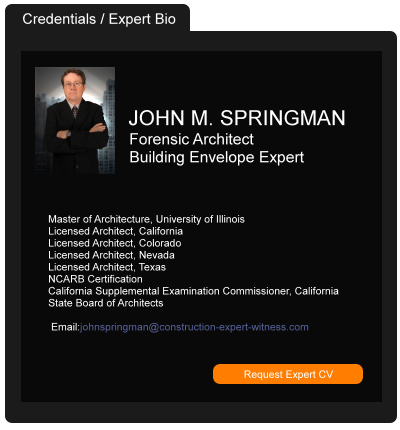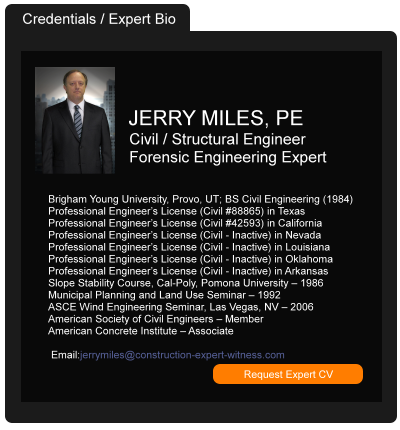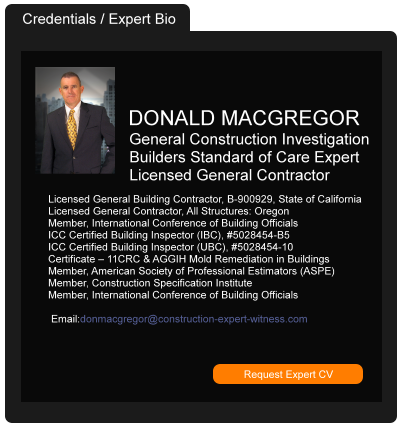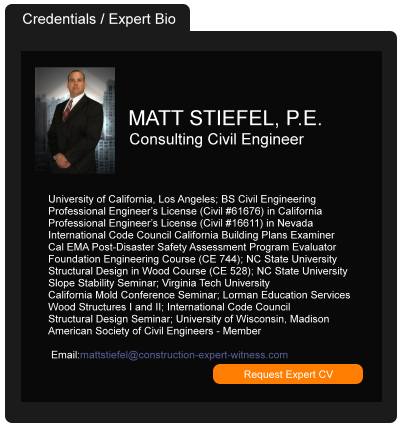Colorado’s New Construction Defect Law Takes Effect in September: What You Need to Know
September 07, 2017 —
Jesse Witt - The Witt Law FirmColorado’s new construction defect law officially takes effect this month. Although HB 17-1279 was passed in May, the statutory text provides that it only applies “with respect to events and circumstances occurring on or after September 1, 2017.” With that date now upon us, practitioners should be mindful of the law’s new requirements.
The law applies to any lawsuit wherein a homeowner association files a construction defect action on behalf of two or more of its members. “Construction defect action” is defined broadly to include any claims against construction professionals relating to deficiencies in design or construction of real property. Before an association may commence such an action, its board must follow several steps.
First, the board must deliver notice of the potential construction defect action to all homeowners and the affected construction professionals at their last known addresses. This requirement does not apply to construction professionals identified after the notice has been mailed, or to construction professionals joined in a previously-approved lawsuit. The notice must include a description of the alleged construction defects with reasonable specificity, the relief sought, a good-faith estimate of the benefits and risks involved, and a list of mandatory disclosures concerning assessments, attorney fees, and the marketability of units affected by construction defects. The notice must also call a meeting of all homeowners. The notice should be sent to the construction professionals at least five days before the homeowners.
Reprinted courtesy of
Jesse Howard Witt, Acerbic Witt
Mr. Witt may be contacted at www.witt.law
Read the full story... Read the court decisionRead the full story...Reprinted courtesy of
Policy Lanuage Expressly Prohibits Replacement of Undamaged Material to Match Damaged Material
March 09, 2020 —
Tred R. Eyerly - Insurance Law HawaiiConstruing an all-risk Businessowners Policy, the court found that the policy language did not required replacement of undamaged material match materials that were damaged. Pleasure Creek Townhomes Homeowners' Ass'n v. Am. Family Ins. Co., 2019 Minn. App. Unpub. LEXIS 1095 (Minn. Ct. App. Nov. 25, 2019).
The policy covered the Association's 14 townhome buildings. In June 2017, a hail storm damaged siding on all 14 buildings. An appraisal panel included the cost to replace the undamaged, faded siding in its appraisal award so that it would match the new siding. American Family refused to pay this component - which was appraised at about $211,382 - of the award.
An exclusion in the policy provided,
We will not pay to repair or replace undamaged material due to mismatch between undamaged material and new material used to repair or replace damaged material.
We do not cover the loss in value to an property due to mismatch between undamaged material and new material used to repair or replace damaged material.
Read the court decisionRead the full story...Reprinted courtesy of
Tred R. Eyerly, Damon Key Leong Kupchak HastertMr. Eyerly may be contacted at
te@hawaiilawyer.com
City and Contractor Disclaim Responsibility for Construction Error that Lead to Blast
November 13, 2013 —
CDJ STAFFThe city of Grand Junction, Colorado and their contractor, Aperion Utility Construction, LLC, have both denied any wrongdoing in the construction accident that lead to the destruction of two homes. Aperion was drilling in order to repair traffic signals. Their drill damaged a gas line. In the subsequent explosion, three people were injured and two homes destroyed. Homes for 10 blocks were subsequently evacuated.
The three men who were injured have filed a lawsuit claiming negligence on the part of the contractor and the city. The city has released a report from their insurers that concluded that the city was not responsible.
Read the court decisionRead the full story...Reprinted courtesy of
The Cost of Overlooking Jury Fees
February 07, 2022 —
Nicholas B. Brummel, Arezoo Jamshidi & Lawrence S. Zucker II - Haight Brown & BonesteelOn January 21, 2022, the Court of Appeal, Second Appellate District, Division Two (Los Angeles), certified for publication a 2-1 decision that serves as an important reminder to California attorneys to post jury fees in a timely manner and to use appropriate channels and consult with appellate counsel in seeking appellate relief from contested rulings.
In TriCoast Builders, Inc. v. Nathaniel Fonnegra, (B303300, Jan. 21, 2022), a construction defect dispute, the trial court set a jury trial at defendant’s request. However, on the day trial was set, defendant waived jury trial. Plaintiff objected and made an oral request for jury trial. The trial court denied the request finding that plaintiff waived its right to a jury trial by failing to timely post jury fees. The matter proceeded to a bench trial, and the court ruled in favor of defendant. Plaintiff appealed, having failed to seek a writ of mandate, which the appellate court noted “is the proper remedy to secure a jury trial allegedly wrongfully withheld.”
Reprinted courtesy of
Nicholas B. Brummel, Haight Brown & Bonesteel,
Arezoo Jamshidi, Haight Brown & Bonesteel and
Lawrence S. Zucker II, Haight Brown & Bonesteel
Mr. Brummel may be contacted at nbrummel@hbblaw.com
Ms. Jamshidi may be contacted at ajamshidi@hbblaw.com
Mr. Zucker may be contacted at lzucker@hbblaw.com
Read the court decisionRead the full story...Reprinted courtesy of
Maintenance Issues Ignite Arguments at Indiana School
January 31, 2014 —
Beverley BevenFlorez-CDJ STAFFStudents and faculty at Roosevelt College and Career Academy in Gary, Indiana have dealt with the building’s burst pipes since last year, however, the recent cold temperatures have worsened the issue, “disrupting classes and causing costly repairs,” according to the Post-Tribune.
EdisonLearning now runs the school: “The state tapped the private, for-profit education management company for Roosevelt after six straight years of anemically low test scores.” The “lengthy agreement” between EdisonLearning and the school district states holds the district “responsible for major repairs and to maintain the building just like the other schools it runs.”
“The money we were provided is for academic purposes, not for the operation of the building,” said Michael Serpe, spokesman for EdisonLearning told the Post-Tribune. “If you rent a home and the heat doesn’t work, you contact the landlord.”
“If the building is monitored properly, we could stop these problems but we have to get to them earlier,” said Charles Prewitt, the district’s director of building, grounds and maintenance, as reported by the Post-Tribune. Prewitt added that part of the maintenance problems is lack of access. He alleges that “EdisonLearning changed the locks and provided a swipe card for only one door.”
“There always seem to be reasons that things don’t get fixed at Roosevelt when they get fixed everywhere else,” Serpe retorted.
Read the court decisionRead the full story...Reprinted courtesy of
Supreme Court of Kentucky Holds Plaintiff Can Recover for Stigma Damages in Addition to Repair Costs Resulting From Property Damage
August 15, 2018 —
Gus Sara - The Subrogation StrategistIn Muncie v. Wiesemann, 2018 K.Y. LEXIS 257, the Supreme Court of Kentucky considered whether stigma damages[1] in a property casualty case are recoverable in addition to the costs incurred to remediate the actual damage. The court held that stigma damages are recoverable in addition to repair costs, but the total of the stigma damages and repair costs cannot exceed the diminution in the fair market value of the property. The court’s decision establishes that if the repair costs are insufficient to make the plaintiff whole, a recovery for stigma damages up to the amount of the diminution in the market value of the home is appropriate.
Appellants Cindy and Jim Muncie incurred significant property damage to their home as a result of an oil leak originating from a neighboring property owned by the Estate of Martha Magel. In 2011, Auto Owners Insurance Company (Auto Owners), the liability carrier for the Estate’s testatrix, Patricia Weisman, filed an impleader complaint in federal court to discharge its obligation to settle the third-party liability claims on behalf of Ms. Weisman. Auto Owners reached a settlement with the Muncies for $60,000 which represented the remediation costs for the actual damage to the property. The settlement release reserved the Muncies’ right to pursue a claim for stigma damages associated with the oil leak.
Read the court decisionRead the full story...Reprinted courtesy of
Gus Sara, White and Williams LLPMr. Sara may be contacted at
sarag@whiteandwilliams.com
Home Buyers will Pay More for Solar
February 05, 2015 —
Beverley BevenFlorez-CDJ STAFFThe National Association of Home Builders’ (NAHB) Eye on Housing reported that a study’s results “found that homebuyers are willing to pay more for homes that have installed solar photovoltaic (PV) energy systems.” The team of researchers led by the U.S. Department of Energy’s Berkeley Laboratory “estimates a price premium of approximately $4 per watt of PV installed. For a typical PV system, the research team found that this translates into a price premium of $15,000.”
Furthermore, according to the NAHB, the study “suggests that the presence of energy-efficient home features is among the most important concerns for prospective home buyers.”
Read the court decisionRead the full story...Reprinted courtesy of
Anthony Garasi, Jared Christensen and August Hotchkin are Recognized as Nevada Legal Elite
July 06, 2020 —
Dolores Montoya - Bremer Whyte Brown & O'Meara LLPBremer Whyte Brown & O’Meara, LLP is proud to announce Partners
Anthony Garasi and
Jared Christensen in our Las Vegas office, along with Associate
August Hotchkin in our Reno office are being recognized as Nevada Legal Elites in the Nevada Business Magazine.
The Nevada Legal Elite list includes the top 4 percent of attorneys in the state broken down by location. To qualify, each nominee goes through an extensive verification process resulting in the top attorneys in the state, chosen by their peers. Upon the nomination process closing, each ballot is individually reviewed for eligibility and every voting attorney is verified with the State Bar of Nevada.
Read the court decisionRead the full story...Reprinted courtesy of
Dolores Montoya, Bremer Whyte Brown & O'Meara LLP


































































